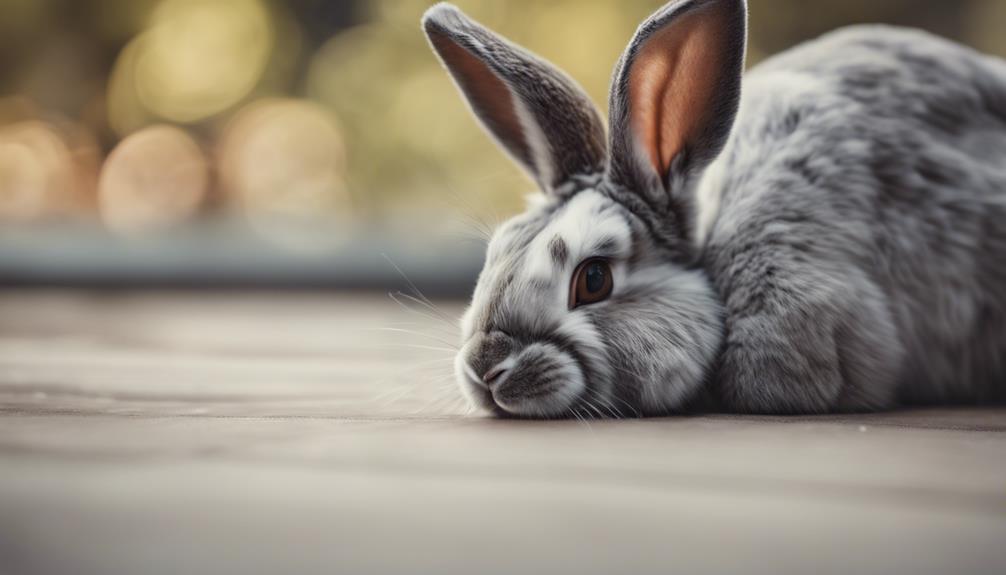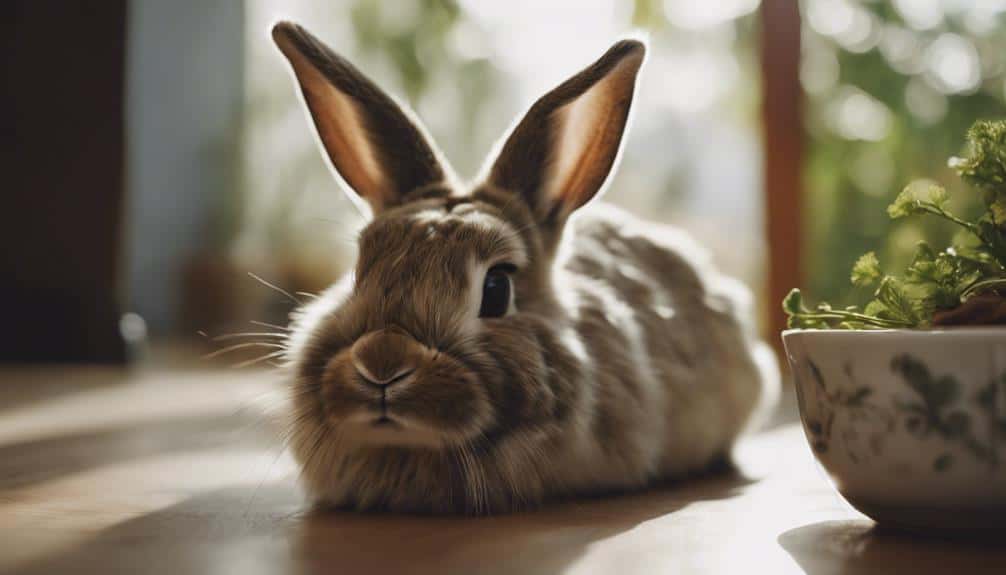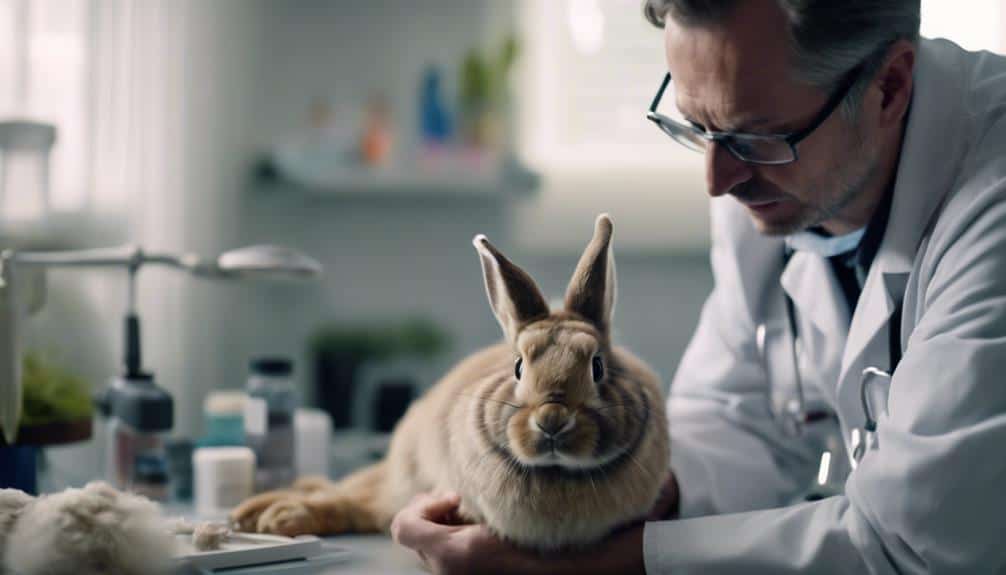Rabbits are incredibly active animals, capable of hopping as high as 3 feet and running at speeds of up to 35 mph.
So, if you’ve noticed your bunny laying down more often than usual, it’s understandable you’re curious about what’s going on. Bunnies can lay down for a variety of reasons, from feeling secure in their environment to taking a well-deserved nap. If your bunny seems particularly relaxed, it might be their way of expressing contentment. For those looking to enhance their pet’s comfort, exploring bunny relaxation techniques can be a great way to ensure they feel safe and at ease in their home.
While it's normal for rabbits to rest occasionally, excessive lounging can be a cause for concern.
There are several possible explanations for this behavior, and it's essential to identify the underlying reason to address it effectively.
Let's explore the possible reasons behind your bunny's laid-back behavior.
Contents
Key Takeaways
If you've noticed your bunny laying down a lot, it might be a sign that something's not quite right. Rabbits who are in pain or discomfort often spend more time lying down than they should. So, if you've seen a change in your rabbit's behavior, it's a good idea to take them to see a vet.
There are some factors that can influence how active your rabbit is, like their age, the weather, or if they're feeling stressed. But if your rabbit is laying down more than usual, it's always better to err on the side of caution.
Gastrointestinal issues, like stasis, can cause your rabbit to feel lethargic and want to rest more. And if you don't catch these kinds of problems early, they can lead to some serious health complications. So, if you've noticed your rabbit laying down a lot, don't hesitate to take them to the vet. It's always better to be safe than sorry!
Signs of Pain or Discomfort

If your bunny is frequently laying down in a hunched position, it could be a sign that they're in pain or discomfort.
Rabbits are usually active and alert, so when they start spending more time laying around, especially in a hunched position, something might be wrong. This behavior is often a way for rabbits to cope with pain or discomfort.
One way to figure out if your bunny is okay is to pay attention to changes in their behavior.
If they're spending more time laying down than usual, that's a red flag. Also, if they're sitting in weird positions, like holding their back legs up, that could be a sign of pain. And if you notice changes in their appetite, water intake, or social behavior, along with excessive laying down, it might mean they've an underlying health issue that needs attention.
Gastrointestinal Stasis Warning Signs
If your bunny's stomach is bloated or they're not eating as much as usual, it could be a sign of gastrointestinal stasis. This is a serious condition that needs attention from a vet as soon as possible.
Keep a close eye on your rabbit's eating habits and behavior. If they're eating less or showing less interest in their food, it could be a sign of a bigger problem. Don't wait to see if it gets better on its own – get them to a vet right away.
The sooner you catch gastrointestinal stasis, the better. With prompt treatment, you can help your bunny feel better and stay healthy.
Stomach Bloating Symptoms
Stomach bloating in rabbits is a sign of gastrointestinal stasis, which means their digestive system has slowed down. One of the most obvious symptoms is a swollen abdomen that feels tender and painful to the touch. You might notice their stomach visibly distending, which can be quite uncomfortable for them.
Along with bloating, your rabbit might seem lethargic, which means they're unusually tired or uninterested in their surroundings. They might also show signs of pain, like grinding their teeth or being restless, which indicates they're in distress.
It's crucial to take a swollen stomach in rabbits seriously, as it can be a sign of an underlying issue like gastrointestinal stasis. If you notice these symptoms in your bunny, get them to a vet right away to prevent complications like intestinal rupture or sepsis.
Keeping an eye on your rabbit's abdominal size and seeking immediate medical attention if you notice any changes can make a big difference in their prognosis and recovery.
Reduced Appetite Cues
If your rabbit isn't interested in food, it could be a sign of a serious problem. Gastrointestinal stasis is a potential issue that can lead to dehydration and malnutrition if you don't address it quickly.
When your rabbit's appetite decreases, look out for other signs like lethargy, less stool production, and a hunched posture. These symptoms often go together with a loss of appetite and can indicate a bigger problem.
You should also observe your rabbit for unusual behaviors like spending more time lying down, hiding, or avoiding interaction.
If you notice a decline in your rabbit's appetite, it's crucial to seek immediate veterinary care.
Impact of Changes in Behavior

Changes in your rabbit's behavior, like laying down more often, can be a sign of how they're feeling and if they've any health problems. Normally, rabbits sleep or rest for around 11-12 hours a day, so if you see your bunny laying down a lot during the day, it mightn't be a big deal.
However, you should keep an eye on your rabbit's overall behavior to see if there are any other signs of illness or stress.
For example, older rabbits or those living in hot weather might be less active and lay down more often. So, it's essential to consider these factors when monitoring your rabbit's behavior.
Another important thing to look out for is how your rabbit lays down. If they're relaxed and stretched out, that's usually a good sign.
But if they're tense or hunched over, it could mean they're uncomfortable or in pain. If you notice your rabbit laying down more than usual and they're also not eating as much or seem lethargic, it's a good idea to take them to the vet as soon as possible to catch any potential health issues early.
Addressing Decreased Activity Levels
Addressing decreased activity levels in rabbits involves keeping a close eye on their laying down patterns and overall behavior for any signs of underlying health issues. While it's normal for rabbits to rest for 11-12 hours a day, changes in their energy levels not explained by factors like time of day or age could be cause for concern.
Rabbits are crepuscular animals, which means they're most active in mornings and evenings. So, being less active during midday is just natural behavior. There are a few factors that can affect your rabbit's activity levels. For instance, time of day plays a role – they're usually most active in mornings and evenings. Temperature can also impact their activity, as hot weather may make them less active. Age is another factor, as older rabbits may be less energetic.
If you notice your rabbit is consistently less active, showing signs of discomfort, or laying down in unusual positions, it's time to seek veterinary care. Regular check-ups and monitoring can help address any underlying health conditions contributing to decreased activity levels in your bunny.
Importance of Veterinary Attention

If you notice any changes in your rabbit's behavior, it's crucial to seek veterinary attention right away. Since rabbits are experts at hiding illness, even slight changes in their body language, such as being less active, hiding, avoiding you, or standing in an unusual way, can be a sign of an underlying health issue.
If your rabbit stops eating or producing stools for more than 6-8 hours, consider it a medical emergency. You need to get them to a vet ASAP to prevent things from getting worse.
A vet visit is essential for a thorough physical examination to accurately diagnose any condition and prescribe the right medication. Remember, vets can't diagnose or prescribe meds online. If your rabbit is limping or showing signs of pain, they need to see a vet to rule out any underlying health problems.
Veterinary guidance and support are vital for providing the right care and medication to help your rabbit recover. So, it's crucial to find a local vet and get your rabbit in for an in-person examination as soon as possible to address any health concerns effectively.
Preventive Measures for Rabbit Health
Taking care of your rabbit's health is crucial for their overall well-being and long life.
It's normal for rabbits to have off days, but if you notice a significant change in their activity levels without any apparent reason, that's a red flag.
To prevent boredom, stress, and health issues, make sure they've a safe and stimulating environment with plenty of hay, toys, and social interaction.
Regular check-ups with your vet are vital for catching any underlying health conditions early, especially as your rabbit gets older.
Keep an eye out for signs like loss of appetite or unusual postures that could indicate a problem.
Factors like hot weather, age-related changes, and depression can affect your rabbit's activity levels, so it's essential to understand how these factors influence their behavior.
Conclusion
So, if your bunny is spending more time on the ground than usual, it's worth paying attention to. This behavior could be a sign of some underlying health issue or discomfort.
Think about it like this: if your bunny is laying down more than usual, it might be trying to conserve energy or avoid pain. That's why it's essential to keep an eye on changes in their behavior, appetite, and social interaction.
By doing so, you can catch any potential problems early on.
The key to keeping your bunny healthy and happy is prevention. By staying alert and proactive, you can make a huge difference in your furry friend's life.






